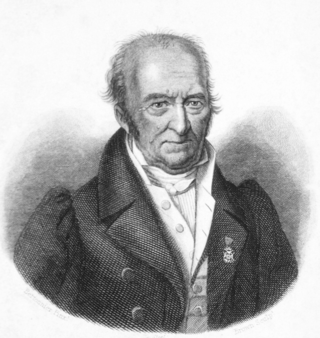
Pierre André Latreille was a French zoologist, specialising in arthropods. Having trained as a Roman Catholic priest before the French Revolution, Latreille was imprisoned, and only regained his freedom after recognising a rare beetle species he found in the prison, Necrobia ruficollis.

In zoological nomenclature, a type species is the species name with which the name of a genus or subgenus is considered to be permanently taxonomically associated, i.e., the species that contains the biological type specimen. A similar concept is used for suprageneric groups and called a type genus.

Cleridae are a family of beetles of the superfamily Cleroidea. They are commonly known as checkered beetles. The family Cleridae has a worldwide distribution, and a variety of habitats and feeding preferences.

Buprestis is a genus of beetles in the tribe Buprestini, the jewel beetles. As of 2011 there were 78 described species distributed across most of the world's biogeographic realms except parts of Africa and Antarctica.
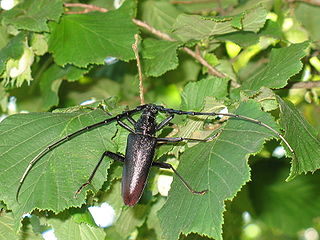
Cerambyx is a genus of beetles in the family Cerambycidae. They are commonly known as capricorn beetles, as their strong, stout and curved antennae, each segment of which flares towards the tip, are reminiscent of the horns of an Alpine Ibex or "capricorn".

Larinus is a genus of true weevils, comprising about 180 species, mostly in the Palaearctic region with some species introduced to North America. Turkey appears to have a significant diversity of the group, with more than 50 species recorded in the eastern part of the country.

Chrysolina is a large genus of leaf beetles in the subfamily Chrysomelinae. Most species are distributed in Europe, Asia and Africa with a small number of species inhabiting North America and introduced species in Australia.

Heliocopris is a genus of Scarabaeidae or scarab beetles in the superfamily Scarabaeoidea. Forty-seven of the fifty-two known species are found in Africa, but a few are found in southern and southeast Asia.

Korynetes caeruleus, also known as the steely blue beetle, is a predatory beetle in the family Cleridae. The species name is occasionally misspelled as "coeruleus" (e.g.,), but the spelling caeruleus is preserved by Opinion 604 of the ICZN, issued in 1961.

Rhagium is a genus of flower longhorn beetles in the family Cerambycidae, Cerambycidae.

Oryctes is the most economically important genus of rhinoceros beetles in the subfamily Dynastinae, since it includes a notorious insect pest of palms.

Saperda is a genus of flat-faced longhorn beetles belonging to the family Cerambycidae, subfamily Lamiinae. The genus was erected by Johan Christian Fabricius in 1775.

Acanthocinus is a genus of longhorn beetles of the subfamily Lamiinae. It was described by Megerle in 1821.

Neoclytus is a genus of beetles in the family Cerambycidae. They measure 4-20 mm. There are 93 species in the New World.
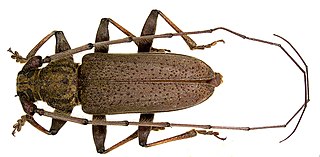
Stromatium is a genus of beetles in the family Cerambycidae, containing the following species:

Ceroplesis is a genus of flat-faced longhorn beetle in the subfamily Lamiinae of the family Cerambycidae.
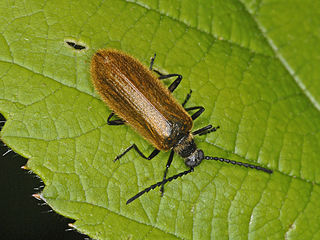
Lagria is a genus of beetles in the family Tenebrionidae.
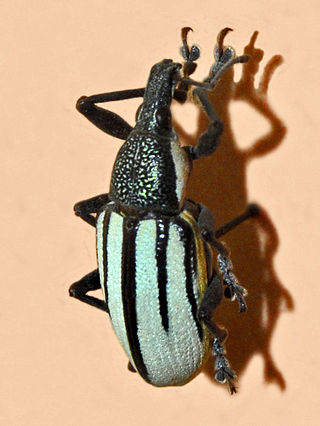
Diaprepes Schönherr 1823: 1140 is a genus of broad-nosed weevil belonging to the family Curculionidae, subfamily Entiminae, tribe Eustylini.
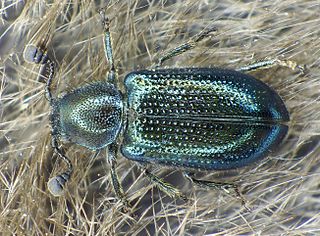
Necrobia violacea is a species of beetle in family Cleridae. Cleridae beetles are a predaceous beetle found within forest and woodland environments, and can be associated with stored food products as both pests and predators of other insects.
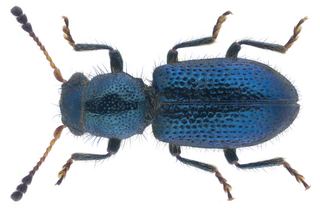
Korynetes is a genus of beetles belonging to the family Cleridae.




















